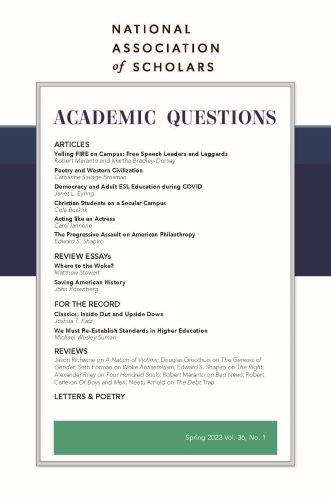To the Editor:
With genuine gratitude I thank Professor Gorman Beauchamp for his careful reading of my book Appreciating Shakespeare and his thoughtful and generally supportive review (“The Bard’s God,” Winter 2022). I would like, though, to correct two minor errors in his review, to knock over some straw men, and to suggest two counter-interpretations.
The first minor error is that “Rappaport’s spelling” is not “Bullingbroke” but “Bullingbrook” (following the Riverside edition). The second lies in Professor Beauchamp’s phrase “if the play [The Merchant of Venice] were anti-Jewish.” The play certainly is anti-Jewish in that Shylock is a humanized stereotype based on the Christian theology of supposed Jewish spiritual blindness. The point is that the play is not racially anti-Semitic in the modern sense.
Now to the straw men:
First, I don’t see how my assertions about the unity of Shakespeare’s plays implies that there should never be cuts in productions. Of course, I would like to see Shakespeare’s plays cut as little as possible. But the dramaturge is always at the service of the director, and part of his job is to help make required cuts judiciously. That modern audiences have less patience than Shakespeare’s audience for some kinds of sub-plot humor (as in Measure for Measure) or main-plot lamentation (as in Romeo and Juliet) does not alter the fact that there is thematic unity to the plays. And the cuts in Olivier’s film of Henry V, though extensive, left that production far truer to Shakespeare’s vision of Henry, than, say, the Branagh film, which, in order to emphasize the blood-and-mud Henry of the modern cynical imagination, committed more than a few travesties on the text (e.g., not just reporting but depicting the hanging of Bardolph in a hard-hearted Henry’s presence).
Second, Professor Beauchamp exaggerates in suggesting that my references to Tillyard’s Elizabethan World Picture imply that I assumed “everyone at the time must have thought in this way,” or that I disagree with Helen Gardner that Shakespeare “was not an average Elizabethan.” But though Shakespeare was indeed addressing (in Meinecke’s phrasing) “inner conflicts” and “tragic problems,” he was doing so with an overarching vision in which “modern and sophisticated” did not mean morally relative or nihilistic. Rather his art exhibits and vivifies a faith in the ultimate order and meaning of things.
The third straw man is Professor Beauchamp’s assertion that I think Falstaff is “there only to be overcome for Hal’s reformation.” That “only” is a trivializing misrepresentation. My attempt to articulate the moral meaning of Falstaff and of Prince Hal’s relation to him takes nothing away from the hilarious wit and vitality of Shakespeare’s superbly irresistible character. But the phrase “and banish all the world,” though compelling, is a brag. Falstaff is in a sense all worldliness. But there are other dimensions to the world that a good king must attend to, and to them Falstaff, for all his wit, is an enemy, harmless only thanks to Hal’s virtue. To call King Henry’s final rejection of Falstaff “a betrayal of honest friendship” is to malign the very concept of honest friendship. The man who says “Let us take any man’s horses; the laws of England are at my commandement,” entertaining though he is, can be no true friend to the king.
Now to the counter-interpretations. The chapter on Henry V in Appreciating Shakespeare is itself the answer to most of Professor Beauchamp’s objections, and readers are welcome to decide between us. (The book is now available to them in paperback.) But on the matter of the Harfleur speech, Shakespeare’s Henry must be defended against the calumny that he “brought his soldiers to France to engage in just the behavior with which he threatens Harfleur.” No. He brought them to France to take back his inheritance. His speech to Harfleur is made as bloody and brutal as possible in order to prevent the horror of war he so vividly describes, and it succeeds in its purpose. To mistake Henry’s eloquent warning against the evils of war for a bloodthirsty delight in them is to mangle the play and to ignore or deny everything we are shown about Henry’s inner life in the rest of the play. Likewise, the killing of the French prisoners is a response to the breach of the “law of arms” that the cowardly French committed in going behind the lines of battle to murder all the English boys. It should be remembered that the French “prisoners” were not chained down but remained imprisoned on parole. If the French “cowardly rascals that ran from the battle” were capable of the “knavery” of killing the boys, the prisoners might well break their oaths and attack from behind. And yes it is true that what Henry achieves is lost in the next generation, but as Shakespeare had already shown on his stage, the chaos after Henry’s death was the result of villainous corruption on all sides. What Professor Beauchamp calls the choral “deflation” takes nothing away from the glory of Henry himself.
Lastly, as my argument does not neglect our pleasure in the character of Falstaff, so it does not deny the awfulness of the death of Cordelia or the anguished despair of Lear in his reiterated “never.” I do argue—and Professor Beauchamp presents my case not unfairly here—that despair is not the final word. Visually, Lear’s carrying in the dead Cordelia is a version of Michelangelo’s Pieta. The essential difference is that in Shakespeare’s medium the story unfolds in time, whereas in Michelangelo’s medium the whole must be represented in a single unchanging image. No one would undervalue in the sculpture the anguish of the Virgin or the awfulness of the deadness of the Christ on her lap. Nevertheless, it is equally true that no one would argue that the viewer’s reaction to that sculpture was meant by Michelangelo to be despair. The very anguish and loss imply redemption. And the same is true of Shakespeare’s Lear, whose long and profound suffering have purged him of sin and readied him for an unimaginable reward for which Shakespeare gives us powerful and moving reason to hope.
In his comments on my discussion of these two plays—Henry V and King Lear—I’m afraid that we have to include Professor Beauchamp among those who believe that “modern and sophisticated” must perforce mean cynical, and that coherent moral and spiritual meaning must imply oversimplification. But I am entirely with him when he concludes that “it remains for the reader to decide.”
Gideon Rappaport, Ph.D.
San Diego, California
To the Editor:
Noël Valis's article: "On Buckley's God and Man at Yale at Seventy" in the Winter 2022 edition of Academic Questions is a tinder-box of ideas. She goes to the heart of what people are worried about: our confusions and uncertainties about what is happening in the world today.
Valis faults our "dismal desire for certainty and absolutes." She deals with that desire for easy answers on many fronts. She insists that there are no certainties or absolutes for particular problems. She leaves us facing the quintessential human problem, the cause of all human iniquity: our virtue, character, integrity, and honesty shortfall.
Honesty is the one certainty, the one absolute, that does not itself fail. If all people were honest, there would be: "no cheating, no crime, no war." Benjamin Franklin's "best policy." The human panacea? Honesty would resolve all the problems Valise lists or alludes to.
1. Value neutral education.
2. Conformity cowardice.
3. Lack of road maps.
4. Contempt for perfection.
5. Elitist virtue signaling.
6. Utopian social grandstanding.
7. Our failure to "conform" to what all should conform to: Honesty.
Pierce Woodriff
Orange County, Virginia
Noël Valis responds:
I am grateful to Pierce Woodriff for his kind letter and agree with him that honesty is much to be desired. Deceit, alas, came with the first bite, and we have been grappling with our imperfections ever since. Though I take heart in the last lines of Milton’s Paradise Lost: “The world was all before them, where to choose /Their place of rest, and providence their guide; /They hand in hand, with wandering steps and slow, /Through Eden took their solitary way.”
Noël Valis
Yale University
New Haven, Connecticut
To the Editor:
John Sailor’s astute review of Stanley Goldfarb’s book Take Two Aspirin and Call Me by My Pronouns (“Malpractice in Medical School,” Fall 2022) criticizes DEI’s malign influence in medical schools. Not only has there been a decline in standards used for admission in order to increase the number of black and other underrepresented medical practitioners, Sailer explains. “But there has also been an ongoing failure to hold students to consistent standards during medical school.” This brings to mind a question I would pose to “woke” advocates: Assume you are scheduled for brain surgery tomorrow in which past patients prove to have a fifty percent chance of surviving. You get to pick between two possible surgeons—one is black, the other is white. Which one would you choose?
Robert Spaulding
Adjunct Professor of Economics, ret.
San Diego State University













